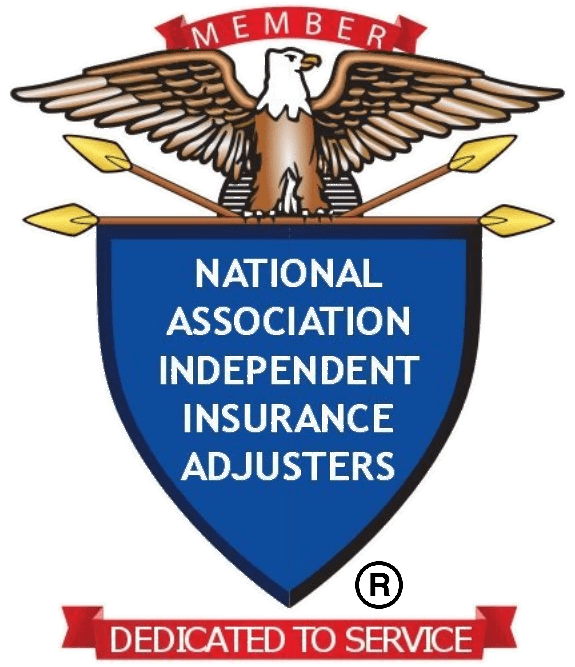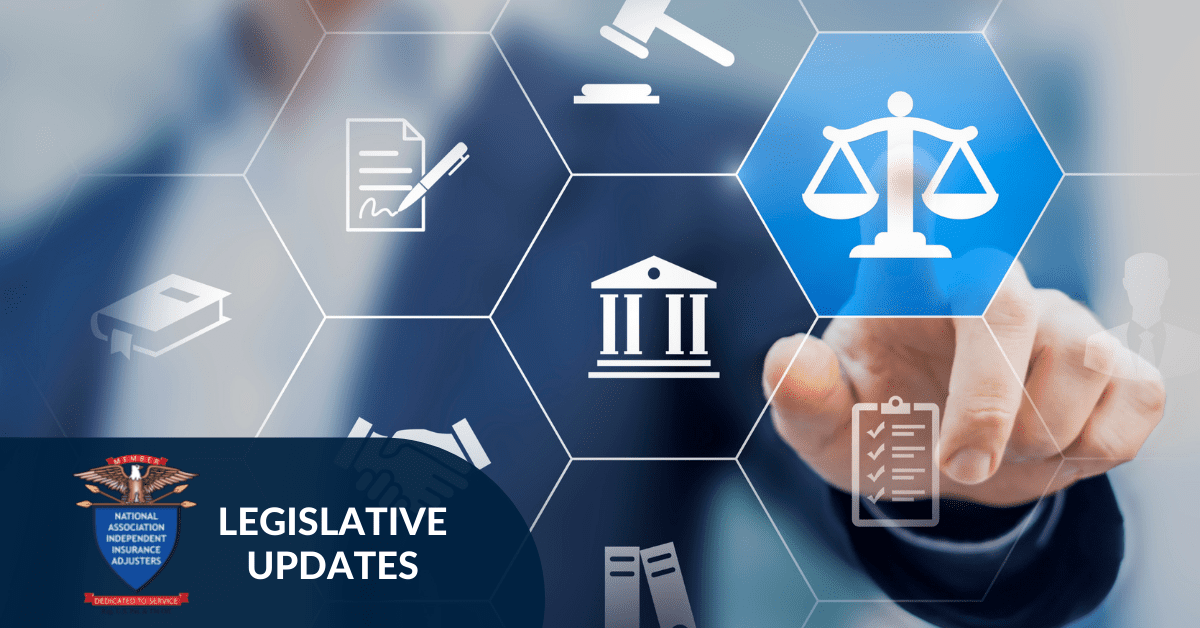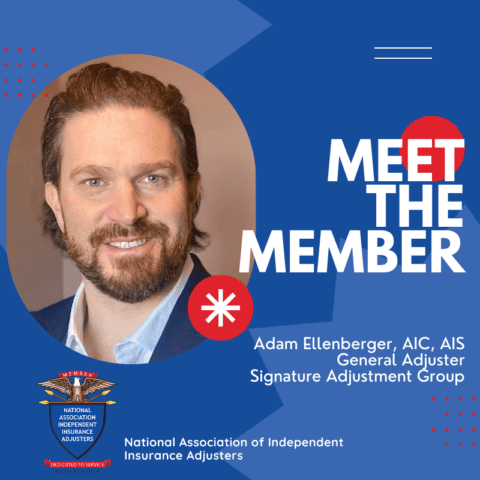There is a changing status of the law concerning employee classification and mandatory benefits in various states, as well as the Federal Government. You can view the Federal Act (FLSA) here. California has been at the fore front as far as states, but many other states have since followed suit, including Connecticut, Illinois, Maryland, Massachusetts and New York.
Legislative Committee
National Chair Barry A. Parks of Hausch & Company Barry@HauschCo.com
We are excited to announce the appointments of the regional legislative chairs and their quarterly updates!
Eastern Region
Co-Regional Chair: Frank Marx from Curley Adjustment frank.marx@curleyadjustment.com
Co-Regional Chair: Charles Reilly from Edward R. Reilly & Co., Inc. creilly@reillyandco.com
Massachusetts
SB 303 and H 1082 say that no affidavit shall be required to be completed for any insurance or coverage under an insurance policy procured by a special insurance broker for which said special insurance broker has previously completed an affidavit, if the policy is renewed, continued or extended by the same insurance company. WSIA and the New England Surplus Lines Association (NESLA) submitted testimony in support of the bill at a hearing last October and now the bill has been passed out of the Joint Committee on Financial Services. WSIA will continue working with local stakeholders to get the bill through in this legislative session.
H 1050 would exempt several admitted commercial risks from rate and filing requirements. WSIA and the NESLA submitted testimony offering an amendment to the bill that would also exempt the same risks from diligent search requirements when placed in the nonadmitted market. This bill also passed the Joint Committee on Financial Services and WSIA will continue to work toward an amendment that will exempt the listed risks from diligent search requirements.
S 720 and H 1133 facilitates the placement of private flood insurance and would allow a surplus lines broker to place flood insurance without making a diligent search of the admitted market.
New York
S 8128 and A 9117 permit a waiver of the diligent effort requirement in limited circumstances for certain insurance coverage to be placed by licensed excess line brokers with unauthorized insurers where a retail producing insurance broker seeks to procure or place commercial lines insurance through an unaffiliated wholesale excess line insurance broker.
S 8127 and A 9088 would simplify the excess line insurance placement affidavit requirements by reducing the number of data points required on the affidavit.
S 3079 and A 7488 prohibit the exclusion of coverage for losses or damages caused by exposure to lead-based paint; provides that no insurer licensed or permitted by the superintendent to provide liability coverage to rental property owners shall exclude coverage for losses or damages caused by exposure to lead-based paint. It’s unclear if the legislation as drafted would apply to surplus lines policies.
Rhode Island
HB 7752 would make a clarification to surplus lines licensing law that would permit surplus lines brokers to place certain A&H policies.
Southeast Region
Regional Chair: Tristan d’Adesky from Sentinel Claims tristan@sentinel-claims.com
Florida
SHOCKING statistic! In 2021, there were 117,000 Lawsuits filed by Attorneys in the State of FL in the Property Market…the rest of the United States 900. That is NOT a typo. 117,000 in FL, 900 in the other 49 states. This is WHY Home Owner’s Insurance is outrageously expensive, in limited supply and on fragile footing. Call your FL State Senator/Representative, as they have yet to pass any meaningful Tort Reform to end the Abuse in Excessive and Frivolous Litigation.
SB 1728 and HB 1307 would have provided that an eligible surplus lines insurer may participate in the depopulation program of the Citizens Property Insurance Corporation in the same manner and on the same terms as an authorized insurer under elevated capital and surplus requirements, additional filing requirements and other requirements. Both bills contained several other property insurance provisions which all failed to pass.
SB 1402 and HB 951 would have established eligibility requirements for domestic surplus lines insurers (DSLI). HB 951 was a more traditional DSLI bill that would have permitted a surplus lines insurer to write surplus lines insurance in its domiciliary state of Florida, whereas SB 1402 would have permitted a domestic admitted insurer to become eligible as a DSLI without a prohibition on continuing to write admitted business in the state. Both bills were amended several times, but neither was passed before the end of the session.
SB 156 would provide technical amendments to 2020 legislation, requiring loss run statements to be provided to personal lines insureds within a specific period, including insureds covered by surplus lines policies. Amendments were offered to specify that the loss run statements may be provided by the surplus lines licensee on behalf of the insurer. The bill is currently awaiting the governor’s signature and will take effect upon signing.
Georgia
The Georgia Office of Commissioner of Insurance and Safety Fire (OCI) issued Directive 22-EX-3 warning that entities must be licensed before selling, soliciting or negotiating insurance in Georgia. The directive indicates that a tiered fine schedule will be implemented on July 1, 2022 for any person or entity selling, soliciting or negotiating insurance in Georgia without a license.
The OCI issued Directive 22-EX-1 on January 21, requesting data from nonadmitted insurance companies to assist with the reconciling of premium written by nonadmitted companies with premium reported by tax filers. The data is requested through SLIP 90 days after the end of the quarter for foreign insurers and annually by June 30 for alien insurers.
The OCI issued Bulletin 22-EX-2 urging all licensed insurance companies to review their financial holdings and operations to begin the process of identifying and divesting from any investments and/or operations in Russian assets or operations that may provide financial support for Russia
Mississippi
HB 451 would re-allocate money derived from the 3% nonadmitted policy fee. Between July 1, 2022 and July 1, 2026 annual revenue of $8 million would be remitted to the Mississippi Windstorm Underwriting Association and the remainder to the state general fund. The bill also allows the association to use excess funds to purchase reinsurance in an amount that may exceed the total premiums collected from policyholders.
North Carolina
SB 496 is an omnibus insurance bill that includes provisions related to disaster declarations. Premium collections and cancellations for property and casualty companies would not be eligible to resume until 15 days after the expiration of a disaster emergency and deferral provisions would be applicable to surplus lines policies. The bill adds similar provisions for public health emergencies. The underlying law which already laid out requirements to stay proof of loss statements and required premium deferral in the event of a disaster has previously been interpreted to apply to surplus lines policies. The bill has passed both houses and is expected to become law.
South Carolina
S 432 states that a liability insurer owing a duty to defend an insured, and that defends the insured against a claim, suit, or other action, has a right of contribution for defense costs against any other liability insurer owing a duty to defend the insured against the same claim, suit, or other action, provided that contributions may not be sought from any liability insurer for defense costs that are incurred before the liability insurer receives notice of the claim, suit, or other action. The bill is applicable to all liability policies issued in South Carolina including those issued by surplus lines insurers. The was favorably reported out of the Banking and Insurance Committee on March 24.
Mid-States Regional
Regional Chair: Chris Davis from Davis Claims Service chris@davisclaimsservice.com
Illinois
SB 1571 makes amendments to the Foreign Fire Insurance License Fee Act and shifts the administration of the fee from the Illinois Municipal League to a foreign fire insurance board. An exemption from the fee has long been provided for nonadmitted policies by the Illinois Municipal League and it is unclear if such an exemption will remain when the administration of the fee shifts to the independent board. The bill has passed both houses, is expected to be signed, and will take effect January 1, 2023.
HB 2739 would facilitate the placement of private flood insurance and exempt surplus lines flood placement from the diligent search requirement. The bill was amended to remove the diligent search relief but contains a provision requiring the producer, surplus lines broker or insurer to provide notice of the existence of the NFIP prior to placing the private flood insurance.
Indiana
In 2018, after discussions with WSIA, the Indiana Department of Insurance (DOI) agreed to eliminate monthly zero-premium reports for surplus lines brokers on the grounds that they were burdensome and not required by law. WSIA recently found that the Indiana website still contained the instructions: “Surplus lines producers are required to make monthly filings in accordance with IC 27-1-15.8-4(b) even if the surplus lines producer has placed no business within the month reported.” Our understanding is that this provision was not being enforced and recently confirmed that the DOI’s position has not changed, and the website has been updated with the zero report requirement removed.
Kentucky
The Department of Insurance issued draft amendments to Section 806 Kentucky Administrative Regulations 10:030 that modify surplus lines affidavit filings. Currently, affidavits must be filed within 15 days after the invoice date or effective date of the transaction, but the draft amendments would require the affidavit to be filed within 15 days of the effective date, eliminating the invoice date option. The regulation would also reinstitute quarterly zero-premium reports for all licensed brokers. Both provisions were previously negotiated by WSIA with department staff when the regulation was reviewed in 2019. The Department of Insurance indicated it was withdrawing the regulation until the end of the legislative session when it would schedule a call with the industry to find a mutual solution.
Michigan
SB 461 provides for the licensing and regulation of medical marijuana growers, processors, provisioning centers, secure transporters, and safety compliance facilities. The bill requires that the financial security requirements must be provided by a licensed insurance company or licensed captive insurance company; however, the marijuana regulatory agency cited in the bill has indicated that they would accept nonadmitted policies if marijuana licensees are unable to secure insurance in the admitted market.
Minnesota
HF 4245 makes clarifications to licensing statute that clarify that an eligible surplus lines insurer has not assumed a risk if premium for the risk has never been transmitted to the surplus lines insurer. The bill also clarifies that surplus lines insurers and brokers are exempt from the statute regarding agent appointments.
North Dakota
The North Dakota Insurance Department issued final amendments to Admin Code 45-09-01-03, which makes technical changes to the code that comply with changes made in 2019 HB 1075 regarding filing dates. The changes correspond with the new statute which requires filings to be made two months after the end of each calendar quarter.
Ohio
SB 256 provides for the regulation of travel insurance and specifies that surplus lines taxes associated with travel insurance must be paid in accordance with ORC 3905.30 to 3905.38 (surplus lines code) not in accordance with the provisions specified in the bill.
Southwest Region
Regional Chair: Preston Stoek with Primeco Claims pstoeck@primecoclaims.com
Louisiana
In addition to the highly concerning SB 162 outlined at the beginning of this report, there are several other Louisiana bills we are monitoring, including:
SB 21 requires nonadmitted insurers to comply with the statutory contact information requirements to be placed on the approved unauthorized insurer list.
SB 105 requires an insurer writing property, casualty and liability policies mail, or deliver the insured at his mailing address shown on the policy, a notice of renewal, rate increase, change in deductibles, reduction in limits, or coverages at least 30 days prior to the policy’s expiration date. It also provides that if an insurer fails to provide a 30-day notice, the insured has coverage at the expiring policy’s rates, terms, and conditions, and the policy remains in effect until the insurer gives notice or until the insured obtains replacement coverage, whichever occurs first.
SB 134 clarifies that prohibited use coverage shall be triggered when a civil authority issues either a formal evacuation order or another public safety announcement that the area should be evacuated because of a covered peril.
SB 198 requires that after a third adjuster is assigned during a catastrophe, the insurer must have a summary report of the claim disposition up to that point including information such as the undisputed amount to be covered and a list of issues that remain in dispute.
HB 280 provides that every insurer writing any form of commercial or residential property insurance, automobile insurance, marine, or inland marine insurance or writing life or health and accident insurance and health maintenance organizations, managing general agents, and third-party administrators shall maintain a catastrophe response plan or plan that describes how the insurer will respond to a catastrophe affecting its policyholders.
The Louisiana Department of Insurance (LDI) issued Directive 219 on January 24 directing all authorized and surplus lines insurers of their obligation to comply with La. R.S. 22: 1704(E)(2), which grants insureds the right to hire a public adjuster to help meet obligations under their insurance policy. Insurers, as defined in La. R.S. 22 :46(10), include every person engaged in the business of making contracts of insurance.
The LDI reissued Bulletin 2021-08 on January 3, with additional guidance and terms and conditions for the Hurricane Ida Voluntary Mediation Program.
Louisiana prohibition on cancellation/nonrenewal of un-repaired properties (SB 162)
SB 162 would prohibit cancellation and nonrenewing of any admitted or nonadmitted insurance policy in a declared disaster area until 90 days after the property is repaired. The law would be applicable to both personal and commercial lines of insurance and must be in an area subject to a declared state of emergency and been damaged by a named storm or windstorm. A structure subject to the law would only be considered repaired once it is insurable under a similar property insurance policy offered by another insurer operating in Louisiana, except for the Louisiana Citizens Property Insurance Corporation (Citizens), the residual property market in Louisiana.
Oklahoma
HB 3275 makes changes to the Oklahoma Market Assistance Association and would have required surplus lines carriers offering homeowners’ or homeowners’ liability coverage in the state to be members of the association. Association members are required to quote, at a minimum, one out of every five applications referred to them within 10 working days. Operations of the association are funded through assessments of the participating insurers. WSIA worked with our partners and the Oklahoma Insurance Department to successfully amend the bill to eliminate surplus lines insurers from mandatory participation.
SB 1592 would create the Educators’ Professional Liability Insurance Program for full-time and part-time personnel employed by a public school district and a public charter school. The program would be administered by the Office of Management and Enterprise Services, who may contract liability insurance from a licensed insurer, create a self-insured risk pool, or use a combination of both. Concerns that if the state offers teachers a free policy without divulging its significant limitations, teachers’ associations offering a more comprehensive coverage may lose members.
Western Region
Regional Chair: J.D. Daniels from Northern Adjusters jddaniels@NADJ.com
Alaska
The Alaska Surplus Lines Placement List was reissued in Order R22-01 on January 19, 2022 with the addition of “professional media liability” and “construction weather parametric” to the placement list.
Arizona
HB 2612 removes certain arbitrary criteria listed as necessary to achieve certain occupational licensing, including the qualification of being “trustworthy” to be eligible for a surplus lines broker license.
California
The California Department of Insurance (CDI) issued a Notice on March 14 strongly urging all insurance companies that transact business in California to act now to review their financial holdings and to take immediate steps to identify and divest from any direct investments in Russian assets or property that have the potential to provide revenue or other financial support for Russia. The notice is directed at both admitted and nonadmitted insurance companies.
The CDI issued a Notice on March 11 regarding the FAIR Plan and whether a diligent search of the “normal insurance market” should be conducted before a licensed producer may place insurance with the plan. The notice addresses a document issued by the FAIR plan on November 23, 2021, that indicates risks should be submitted to the FAIR Plan for coverage after a diligent search of the normal insurance market (defined as both the admitted and nonadmitted market) has been made and goes on to say that a diligent search is mandated under California Insurance Code section 10093(a). However, the clarifying CDI notice states that even though brokers submitting FAIR Plan applications may have to certify that a diligent search of the normal insurance market was conducted, “it is the view of the Department that brokers are not statutorily required to prove to FAIR Plan that their search was “diligent” or that insurance in the normal market was “unavailable.”
Colorado
HB 22-1111 requires insurers to provide additional time and flexibility in rebuilding or replacing an insured residence and its contents, additional living expense coverage, building code upgrade costs and a way to directly contact the insurer. The bill would only apply to homeowners’ policies on a total loss in a wildfire declared disaster area and does not specify its applicability to surplus lines policies.
Montana
HB 63 makes technical changes to surplus lines insurers’ eligibility statute renaming the NAIC “Non-Admitted Insurers Quarterly Listing” to “Quarterly Listing of Alien Insurers.” Different versions of the bill passed both houses and a conference committee has been appointed.
Utah
The Department of Insurance is amending Rule R590 with technical changes and to codify a $10 late fee for late stamping office filings.





